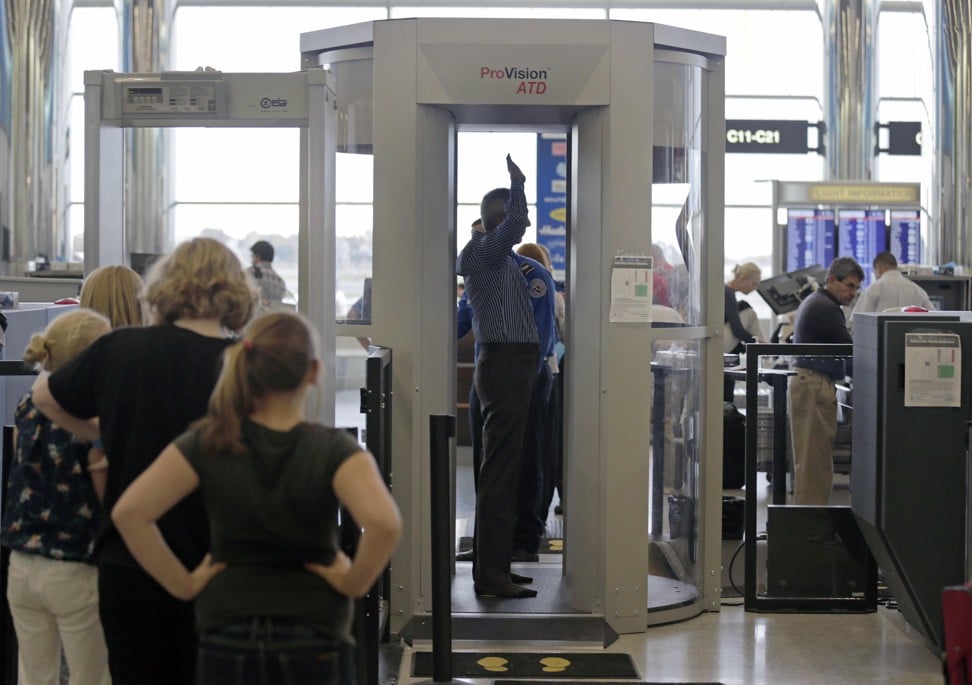
Hong Kong airport offers lessons on passenger dignity for airport security in US and Europe
- Undignified pat-downs and rough treatment at airports in the US and Europe reflect the view that all passengers are potential terrorists. Hong Kong’s genius is in maintaining the highest standards in both airport security and passenger dignity

Should every woman who has survived breast cancer wear a sign announcing the fact when going through airport security scanners – or should it merely be mandatory at German airports? No, it is not a joke, but a seriously angry question about the wretched behaviour of airport security goons. Why can’t other places be like Hong Kong, and why can’t Hong Kong remember its genius?
At Frankfurt airport recently, my wife went through a millimetre wave scanner: feet on yellow markings, hands in the air. The security woman beckoned my wife out, grabbed her breast, realised the offending area highlighted by the machine was extra padding, and let my wife go. She offered no apology.
At Munich airport last week, the scanner – one of the newer ones that let you keep your hands down at about 30 degrees to your side – was also unhappy with the breast that no longer was. The security woman gave my wife a long fondle before allowing her on her way with no apology. “Just doing our job,” said an official when I complained.
Millimetre wave scanners bounce electromagnetic waves off the traveller to provide an animated image where a suspicious item might be located. “Superman’s X-ray vision but without the harmful X-rays,” is one claim. But do the machines achieve their promise? At San Francisco and Chicago, my cotton shirt was too thick or ruckled for the scanner to cope with, so I had a pat-down. At Washington Dulles at the height of summer, sweat on my back triggered the alarm.

At Munich airport, I lit up completely in the scanner after a walk round the old town in 32 degrees Celsius and a sweaty, crowded S-Bahn train ride. The official gave me a thorough going over, probing my shirt roughly, sliding his hands – without asking permission or offering apology – under the waistband of my trousers and underpants. Finally, he made me sit down and lift each leg, which he massaged and then gave a painful tweak to each foot.
Do these officials get any training in politeness or consideration for passengers, or are they all moonlighting in masochism clubs?
Critics warned years ago that millimetre wave scanners do not cope with water as well as X-ray scanners. They also cannot cope with baggy clothes, wired bras, Afro hair, cysts, or, some critics complain, body fat. Passengers approaching the scanner also have to remove their jackets, jumpers, belts, caps or hats, normally shoes too, completely emptying pockets of even paper and handkerchiefs.
In Hong Kong, security is there to protect us travellers against terrorist and other evil forces; in the West, security officials regard us all as potential terrorists
Have governments and airport operators been bamboozled by the US$250,000 cost of each machine, eight times more than the tried and tested walk-through metal detector?
Airports have had almost a decade since the millimetre wave scanners were first marketed to improve the software and the tolerance criteria for triggering an alarm, and to teach security officials to treat passengers with dignity. That is the most distressing aspect – the loss of dignity.
I longed in Europe and America for the competence, professionalism and courtesy of Hong Kong International Airport security staff. I was privileged some years ago to spend a full afternoon behind the security scenes at Hong Kong airport, and to see how carefully the highest standards are maintained without insulting passengers.
In Hong Kong, security is there to protect us travellers against terrorist and other evil forces; in the West, security officials regard us all as potential terrorists.
This may seem a far stretch from the sad scenes of protests and mayhem tearing Hong Kong apart today. But there is a point worth making. Hong Kong has always won by being steps ahead of the cutting edge, professionally smart, part of China, but showing China the way.
The greatest tragedy is that the Hong Kong government has lost the plot and now waits for Beijing to show the way: the end of a dream.
Kevin Rafferty, journalist and former Osaka University professor, is author of “City on the Rocks: Hong Kong’s uncertain future” published 30 years ago